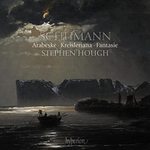|
Back
09/01/2021
Robert Schumann: Arabeske in C major, opus 18 – Kreisleriana, opus 16 – Fantasie in C major, opus 17
Stephen Hough (pianist)
Recording: Henry Wood Hall, London, England (April 24-26, 2020) – 70’07
Hyperion CDA368363 (Distributed by PIAS) – Booklet in English, French and German

   
In three major works for solo piano by Robert Schumann, the British pianist Stephen Hough captures the strengths and deficiencies of Schumann’s uneasy relationship with his chosen instrument, emphasizing the two different personalities that dominated the composer’s musical thought. In Schumann’s written descriptions of his musical philosophy, he terms all that is exuberant and impulsive, “Florestan”, while the introspective and reflective elements of his work are referred to by the name, “Eusebius”. We may wonder today whether Schumann recognized in the deep divisions between these two characters the beginning of his own mental unraveling and decline.
The Arabeske, dating to 1839 when the composer was not yet 30, provides an intriguing study in the dissolution of form, one of the fascinations of Romantic era composers. Instead of following strict sonata form or theme and variations, the work flits from fragment to fragment. Other than advising the pianist to play in a sweet and light manner, Schumann gives performers the freedom to interpret this short caprice as they will. From the first measures onward, Hough seizes this opportunity with zest and energy, yet with an intellectual coolness that pervades all his explorations of Schumann’s thought in this collection.
Hough’s phrasing and crisp delineation of passages could not be better. And yet, I found myself wishing his playing was less precise. At times, I felt as though I was face to face with a “close talker”, a person who speaks with excessive clarity and ever-increasing pitch, as I draw back to create some space between us. Perhaps we needed a third character to arbitrate between Florestan and Eusebius: possibly Catullus, the poet of love, to awaken warm and tender feelings between the two intellectual combatants.
Hough has additional occasions to demonstrate his brilliant articulations in Kreisleriana, inspired by a multi-dimensional character in an E.T.A. Hoffmann story. As a polymath successful in the writing of fiction and non-fiction, and an artist and composer in addition to his talents as a pianist, Hough may have identified with the story behind the music. In eight short movements, composer and pianist whirl through a variety of tempos and expositions, including the six “very’s” (tempo markings of “sehr”—German for “very”—applying to everything from an excited mood to two slow sections). The movements crackle with neurosis, as the composer swings between bipolar dispositions. Yet, within these musical chapters of a fictitious life, I craved tender tides of emotion, a sense of release, a twinge of vulnerability. The strict articulations persisted, with no relief, in a sound as brilliant, glittering, and inflexible as a shower of hard, cold diamonds.
The album concludes with the Fantasy in C major, one of Schumann’s most cherished selections (the opening is the theme of a popular radio program). Though Hough’s technique is just about flawless, I kept wishing for a dreamy interlude here and there, a romanticism where we are free to yield to the soft, less certain side of our nature. Hough brings us some beautiful liquid moments as this rhapsodic sonata in three movements climbs to its final triumphant heights. Many listeners will consider this a perfect recording of Schumann by a leading pianist of our time, and in a sense it is. In many ways, I liked this album very much. But sometimes a little less can actually turn into more.
Linda Holt
|